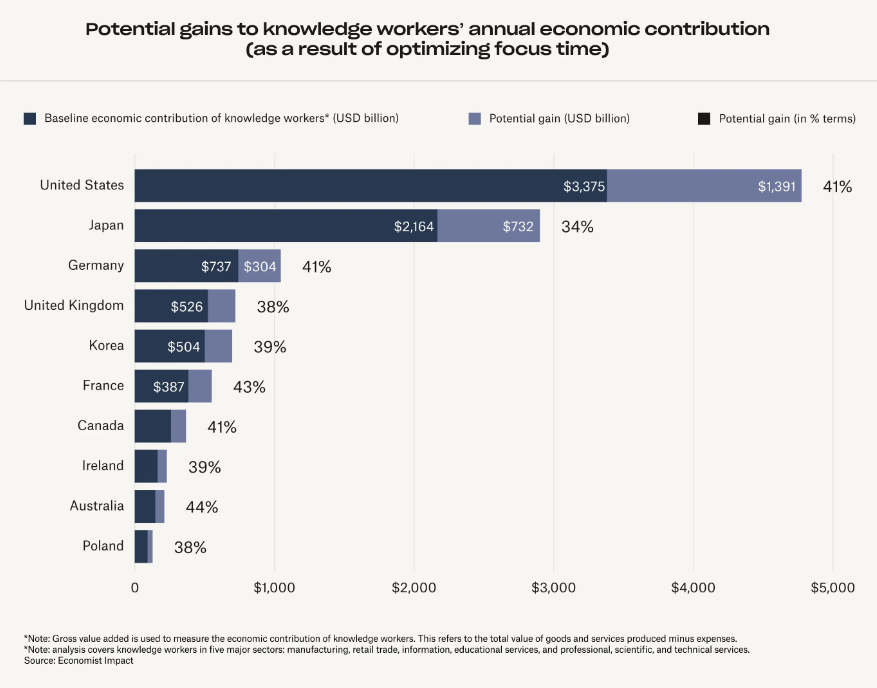Fixing focus could drive $1.4 tril in US economic growth
According to Dropbox, where you work isn’t what matters around these productivity gains.
News In Brief
Organizations are concerned about productivity.
But returning to the office is not the solution, according to Dropbox's latest global research.
Spoiler alert, AI has a crucial role.
The vast majority of CEOs globally believe that there will be a full return to office (five days a week) by 2026.
That’s according to a new report by KPMG. The CEOs’ office-centric outlook is linked to serious concerns about productivity and outputs.
But new research by Dropbox found that a return to the office won’t fix these productivity challenges.
Rather than thinking about where employees work, organizations need to think more intentionally about how people work.
Success here would see employers reap a 40% increase in economic output, says Dropbox and Economist Impact’s survey of 1,000 global knowledge workers.
Constant email and message notifications, and lots of unnecessary meetings, is undermining employees’ focus – 42% of respondents of respondents said they don’t spend more than hour on productive work without interruption, this is because 63% felt pressure to be available at all times.
And these distractions are having a huge economic impact.
Addressing unproductive work chats along yield $31,000 per worker in the US ($360 billion nationwide); this is because the average worker wastes 157 hours a year on unproductive messages.
But the total economic fallout from lost focus at work is even bigger.
In the US alone, fixing distractions could increase workers’ economic contributions by a whopping $1.4 trillion – the figures are $304 billion in Germany and $197 billion in the UK.

AI as a solution to productivity
Of course, it is impossible to eliminate all distractions – and slightly ironically, given that technology is the conduit of workplace distractions, the right tools can help workers and employers find a way through the chaos and rethink how work gets done.
To help here, Dropbox’s report called on employers to focus on the role of artificial intelligence (AI).
The report stated: “The prevailing sentiment among those surveyed by Economist Impact was that AI and automation will help knowledge workers do their jobs better, smarter, and more efficiently—not put their jobs at risk.”
This was because employees saw the value of AI to automate repetitive tasks (40%), and to help them find, organize and summarize information (30%).
40% of respondents said they needed tools to automate repetitive tasks – that was top of the wishlist – while three in ten wanted tools that helped them find, organize and summarize information, and one in five wanted tools that could help them answer questions.
Of those surveyed using AI tools, 79% said they were more productive, three quarters cited that the quality of their work had improved, and seven in ten said they were more organized.
The future of work isn’t about location, it is about using technology the right way.
Dropbox’s report concluded: “It’s our belief that a more enlightened way of working is also a less distracted way of working.”
AI and UNLEASH World
Automation and AI is going to be front and center at UNLEASH World 2023.
Grab a ticket now for our upcoming Paris show to get invaluable, in-person, actionable insights on how to use AI to your advantage from Josh Bersin, as well as HR leaders like Anika Grant and James Purvis.
Sign up to the UNLEASH Newsletter
Get the Editor’s picks of the week delivered straight to your inbox!

Chief Reporter
Allie is an award-winning business journalist and can be reached at alexandra@unleash.ai.

